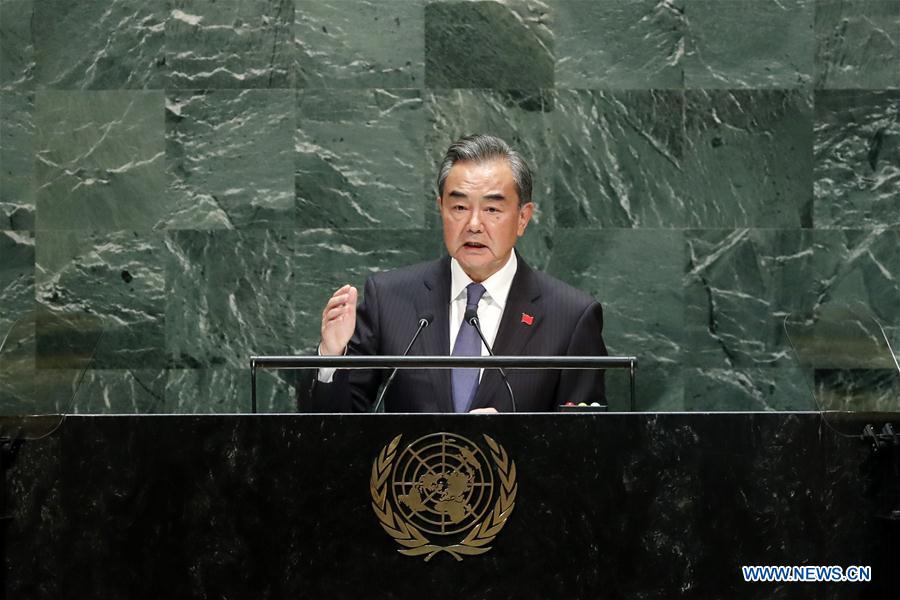
Chinese State Councilor and Foreign Minister Wang Yi addresses the General Debate of the 74th session of the UN General Assembly at the UN headquarters in New York, on Sept. 27, 2019. (Xinhua/Li Muzi)
UNITED NATIONS, Sept. 27 (Xinhua) -- Chinese State Councilor and Foreign Minister Wang Yi on Friday delivered a speech at the General Debate of the 74th session of the UN General Assembly, touching upon a wide range of issues, from development to protectionism and unilateralism, global peace and justice, and climate change.
In his speech, the top diplomat attributed the success of China's development to the country's adherence to the centralized, unified leadership of the Communist Party of China, the development path suited to China's national conditions, the fundamental state policy of reform and opening up, and a people-centered development philosophy.
"In the past 70 years, we Chinese have changed our destiny through tireless efforts," Wang said, noting that 2019 marks the 70th anniversary of the founding of the People's Republic of China.
"Seventy years ago, China put an end to a period in modern history in which the country was torn apart and trampled upon. We stood up and became true masters of our country," he said.
"In just several decades, China has finished what took developed countries several hundred years to complete," Wang said. "In so doing, China has blazed a new path to modernization for developing countries, and what China has achieved has enriched the dreams of people around the world for a better life."
On the diplomatic front, China has traveled a journey of tests and challenges and "has remained true to our original purpose," he said, adding that China is guided by the principle of independence, believes in equality among nations, stands for equity and justice, and pursues mutually beneficial cooperation.
Wang said that the international order needs to go by laws and rules, and acts in violation of international norms can only plunge the world into chaos.
He added opportunities arising from the new round of scientific and technological revolution are opportunities of the world. Advances should not be monopolized by any single country, and no one should obstruct the efforts of other countries to make innovations.
"It is not legitimate or justifiable for any country standing from a position of power to impose unilateral sanctions or exercise long-arm jurisdiction over other countries, as such practice has no basis in international law," he noted.
To put one's own interests above the common interests of all other countries is a typical bullying practice that finds no support of the people, he added.
The world today is not a peaceful place, as unilateralism and protectionism are posing major threats to the international order, he said, underscoring that China stands ready to work with other parties to fulfill its due responsibilities as a major country for upholding global peace and justice.
At a time when the future of the world is at stake, China has never been and will never be an onlooker, he noted. "As a founding member of the United Nations, we will work with other countries to build a new type of international relations and a community with a shared future for mankind," Wang said.
Wang said development is the master key to solving all problems. "Development should be placed at the center of the global macro policy framework, with continued focus on priority areas such as poverty reduction, infrastructure, education, and public health."
"We need to maintain global development cooperation with North-South cooperation as the main channel, supplemented by South-South cooperation. We need to build an open world economy," he added.
Wang added that the UN member states should achieve complementarity between the 2030 Agenda for Sustainable Development and their medium- to long-term development strategies, in an effort to pursue high-quality development.
The Belt and Road Initiative (BRI) aims to achieve development that is open, green and clean as well as high-standard, sustainable and people-centered, he said. "The BRI, an initiative highly compatible with the 2030 Agenda, has become a road to cooperation, hope and prosperity, delivering real benefits to people the world over."
"We hope that other countries will seize the development opportunities created by the BRI to add fresh impetus to the implementation of the 2030 Agenda," he said.
Climate change is a global consensus, Wang noted, adding that the international community needs to respond to this challenge with concerted global efforts according to the principle of common but differentiated responsibilities.
"China believes in acting in good faith. We will deliver what we have signed up to, fulfill our obligations, and work with real actions to contribute to the building of a clean and beautiful world," he said.



